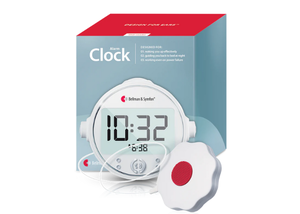Wake Up Easily with a Vibrating Alarm Clock for Deaf Users
Corps
Why a Vibrating Alarm Clock for Deaf Users is a Must-Have
Waking up on time can be a challenge, but for individuals who are deaf or hard of hearing, it often requires more than a standard alarm clock. Traditional alarms rely on sound to alert users, leaving those with hearing impairments at risk of oversleeping. A vibrating alarm clock for deaf users provides a dependable solution using alternative wake-up mechanisms like vibrations and visual alerts.
This article explores the features, benefits, and top options for vibrating alarm clocks to ensure you start your day right.
The Unique Benefits of a Vibrating Alarm Clock for Deaf Individuals
Overcoming the Limitations of Traditional Alarms
Standard alarm clocks rely on auditory signals, which are ineffective for those with hearing impairments. This can lead to missed appointments, late starts, and unnecessary stress.
A vibrating alarm clock eliminates this issue by providing tactile and visual cues, ensuring a timely and effective wake-up call every morning.
Tailored Wake-Up Experience
Vibrating alarm clocks allow users to personalize their wake-up experience. Whether through strong vibrations, flashing lights, or a combination of both, these devices cater to the needs of the deaf and hard of hearing.
Key Features of Vibrating Alarm Clocks
Strong Vibration Mechanisms
The standout feature of a vibrating alarm is its ability to shake a bed or pillow, ensuring the user feels the alert even in deep sleep.
Bright Visual Alerts
Flashing lights complement vibrations by offering a visual wake-up signal. Many models include adjustable brightness settings to suit personal preferences.
Multiple Alarm Options
Some devices combine vibrations with sound for households with mixed hearing abilities, providing flexibility.
Smartphone Integration
Smart vibrating alarm clocks connect to mobile devices, allowing users to set alarms via an app and receive notifications directly on their phones.
Snooze and Customization Settings
Features like adjustable vibration intensity, customizable alarm tones, and snooze options make these clocks versatile and user-friendly.
Top Reasons to Invest in a Vibrating Alarm Clock for Deaf Users
Reliable Wake-Up Calls
Unlike traditional alarms, vibrating alarm clocks ensure you wake up on time without depending on auditory cues.
Improved Independence
A vibrating alarm promotes self-reliance, making it easier for deaf individuals to manage their schedules without outside assistance.
Peace of Mind
Knowing you have a dependable alarm system tailored to your needs eliminates stress and ensures a more restful sleep.
Choosing the Best Vibrating Alarm Clock for Deaf Users
Vibration Strength and Placement
Look for models with powerful vibrations that can be placed under a pillow or mattress for maximum effectiveness.
Battery Life and Power Backup
Ensure the clock has a reliable power source or backup battery to prevent interruptions during outages.
Additional Features
Consider extras like smartphone connectivity, multiple alarm options, or integration with other smart devices for added convenience.
Ease of Use
User-friendly controls and simple interfaces make setting and adjusting alarms hassle-free.
How to Set Up a Vibrating Alarm Clock for Optimal Use
Choose the Right Placement:Place the device under your pillow or mattress for vibration-based alerts to feel the vibrations effectively.
Adjust Alert Settings:
Customize vibration strength, light intensity, and alarm duration to suit your preferences and ensure reliable wake-ups.
Test the Device:
Run a test alarm to verify that all features, including vibrations and lights, are functioning as expected.
Combine with Other Devices:
For enhanced safety, pair your vibrating alarm with other accessibility tools like smart doorbells or smoke detectors.
Maintaining Your Vibrating Alarm Clock
Regular Maintenance Tips
- Clean Periodically:
- For optimal performance, keep the clock and vibration unit free of dust or debris.
- Check Batteries:
- Replace batteries or recharge the device as needed to avoid interruptions.
- Update Firmware:
- For smart models, update your app and device firmware to access new features and improve functionality.
Conclusion
A vibrating alarm clock for deaf users is a game-changer for anyone seeking reliable, personalized wake-up solutions. With features like strong vibrations, bright visual alerts, and smart connectivity, these devices ensure you never miss an important start to your day.
Whether you’re looking for a basic model or a smart alarm with advanced features, there’s a vibrating alarm clock to meet every need and budget. Invest in one today to enhance your independence, peace of mind, and overall quality of life.














commentaires